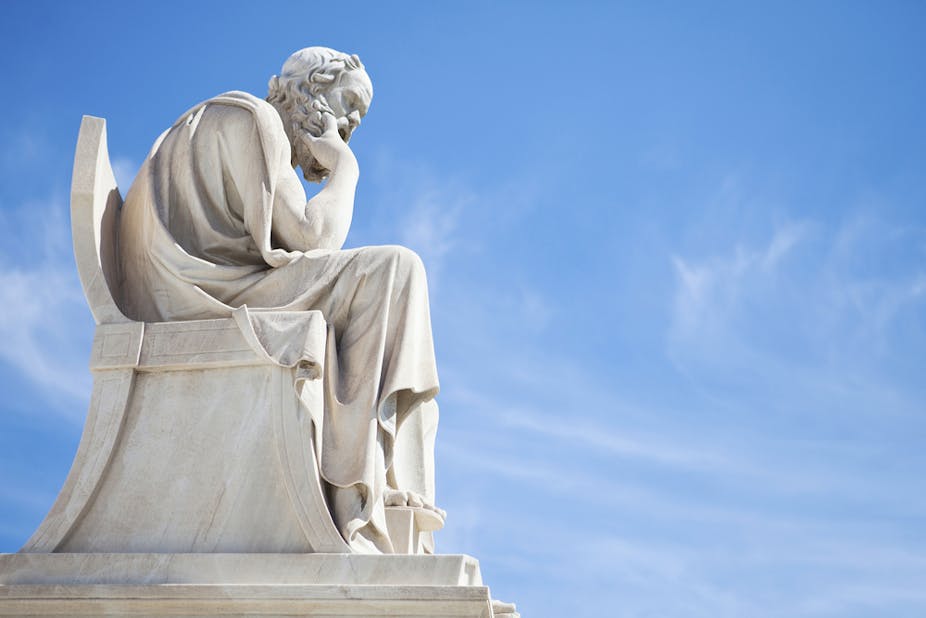According to one founding myth, philosophy begins with a grumpy old man named Socrates being put to death for pestering his fellow citizens about the nature of justice, courage, and other such virtues. This is hardly an auspicious way to start a new academic discipline. But Socrates’ attempt to engage Athenians in dialogue exemplifies both the nature of human inquiry and the public role philosophy ought to play today.
The critical exchanges Socrates initiated with his peers were designed to lead everyone to a deeper understanding of the world around them. In fact, the Socratic method of asking hard questions to encourage reflection, draw out the unwarranted assumptions of an accepted view, and then posit something new characterises the movement of our intellectual history from Plato to Steven Pinker.
Of course, a great deal has changed since Socrates started accosting his fellow citizens in the street. Philosophy is now a highly specialised academic discipline in which scholars employ a technical vocabulary to address everything from art and ethics to the nature of reality and our knowledge of it. As a result, following the latest trends in philosophy requires an advanced degree, if not a PhD. And this means the essays published today in The Journal of Philosophy are inaccessible to the vast majority of people.
There has, however, been a recent push to drag philosophy out of the ivory tower and return it to the street. Radio programmes, podcasts, and online magazines such as In Our Time, Philosophy Bites, and Aeon have done much to render philosophical ideas intelligible to a general audience. And the new popular philosophy column I am running in the New Statesman aims to take this one step further by inviting publicly minded thinkers to address contemporary social, cultural, and political issues from a philosophical point of view.
In this, I’m following Socrates’ lead: challenging the general reader’s position on a particular issue with the hope that they then critically reflect on the values of their community and ultimately learn something new.
Lessons from Socrates
Socrates’ death explains why learning something new is an activity all of us can do.
As mortal beings, we can’t see everything and death speaks to a certain limit on our apprehension of reality. In fact, most of reality stands apart from us as a thought provoking mystery. And given the finite nature of our understanding, our knowledge of the world is always tied to a particular perspective on things.
Take a rose, for example. A physicist may say it consists of a specific set of particles and the forces that act between them. A chemist can explain its basic compounds. A biologist might describe the ecosystem required for a rose to grow. An economist can identify its exchange value. An artist may depict its beauty, and a lover ought to appreciate its romantic significance.
Each of these perspectives teach us something about a rose. But none on their own explains all there is to know. So, to expand our appreciation of the world, we need to accept the incomplete nature of our knowledge, question our own perspective, and adopt alternative points of view.
For his part, Socrates embraced the finite character of human understanding. “Real wisdom is the property of the gods,” he said when on trial for his life. And he famously claimed his distinctive insight consisted solely of this: “I do not think I know what I do not know.”
Socrates’ rejection of any pretence to divine understanding and his doubt over the extent of his own knowledge drove him to question his city’s customs and traditions. He had no qualms about interrupting the daily activities of everyone from doctors and lawyers to poets and priests, pressing them on their deeply held beliefs.
More often than not, Socrates used his superior skill in the art of argumentation to highlight the limitations, inadequacies, and contradictions in a particular person’s perspective. And in the end, Socrates’ irreverence for Athenian practices, his persistent inquiry into the essence of things, and his uncanny ability to annoy his fellow citizens led to his undoing.
Reasonable debate
While most Athenians were uncomfortable putting their traditions to the test, Socrates did develop a following among a motley crew of open-minded students, merchants, aristocrats, and dramatists. These disciples took Socrates’ challenge seriously. They not only cast doubt on their cultural inheritance, but also began to formulate new answers to tough questions about the ethical basis of our actions and the essence of human flourishing.
They also challenged their mentors. Aristotle, for instance, found fault in Plato’s account of the good life in which reason dominates our unruly passions. And Aristotle’s criticisms paved the way for the Epicurean claim that our passions have a positive role to play in our well-being.
Critical exchanges over ethics and the good life continue to this day. This is a good thing: we need more sites for reasonable debate over contentious issues, with the goal of fostering dialogue between engaged citizens across the ideological spectrum. Let’s hope, though, that we are all spared Socrates’ fate…
This is an edited and revised version of an article that initially appeared in the New Statesman.

